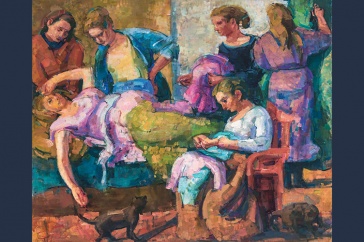

When students come to class at Universidade Federal do Tocantins, Brazil, they often come empty handed. They might not bring a notebook to take notes, or they've left their textbook at home. They're not lazy; they want to learn, but study skills and class preparation aren't a consistent part of the Brazilian educational system.
It's a very different academic environment than the rigorous one at UNH, says Patricia Donahoe '13, who graduated with a dual degree in political science and international affairs.
Since February, Donahoe has been teaching English in the city of Araguaína, Tocantins, and recently started a free study skills tutoring program for local high school students to help bridge the gap and prepare them for their college entrance exam.
"A lot of students here are really passionate; they just want to 'get it,' to really master all the concepts of the English language and grammar," Donahoe says.
The Henniker, N.H., native is working as an English teaching assistant through the U.S. State Department's Fulbright Program.
She admits that even though she had travel experience — she studied in Granada, Spain, the spring of her junior year at UNH — she had a bit of culture shock when she arrived in Brazil. She thought she would be in a metropolitan setting, but found herself 1,500 miles north of Rio de Janeiro, in the still-developing interior part of the country. She settled in for a nine-month stint, became proficient in Portuguese, learned to love the 100-degree weather, and began teaching English to Brazilian college students, covering everything from grammar to political satirical writing.
She quickly noticed that the education system in Brazil — specifically, who goes on to earn a degree from high school and who doesn't — depends largely on who can afford tutoring for the Brazilian college entrance exam, the Vestibular.
"It's a very rigorous exam, over several days, and it seems that only the students who have money to successfully complete the test prep courses do well on the exam. It really seemed to me to contribute to the vicious cycle of poverty in Brazil," she explains.
That phenomenon inspired her to offer the free test prep course to local high schools in Araguaína . She's not certified to teach specifics from the Vestibular, but she has been helping high schoolers learn how to become proactive studiers.
She runs four-week courses on topics like time management, creating positive study environments, and how to take notes in class. She also offers helpful hints such as reviewing and revising your notes after class and following up with a teacher if something is unclear.
"It's been really easy to teach skills to these kids, because I used those skills all the time when I was a student at UNH. They seem like second nature to me," says Donahoe.
She was surprised to learn that basic study skills and test prep were not things that any of her students had ever heard about — from teachers or from their parents, she says.
 So far, she hasn't been able to track her results: students won't take the Vestibular until November at the earliest and continue taking it through January, just before the next school year begins in March. Anecdotally, however, she feels it's working, because students she surveys in her classes nearly always tell her that the skills she is teaching are completely new to them.
So far, she hasn't been able to track her results: students won't take the Vestibular until November at the earliest and continue taking it through January, just before the next school year begins in March. Anecdotally, however, she feels it's working, because students she surveys in her classes nearly always tell her that the skills she is teaching are completely new to them.
With her Fulbright grant wrapping up in November, Donahoe is looking at ways to stay in the country by extending her work through Fulbright, or through other programs. She's also become interested in focusing her graduate studies on international public policy with a focus on education reform based on the new perspective she's gained from her experience.
And while she's learned more about teaching, educational policies, and socio-economic differences, Donahoe also feels that the stint in Brazil has changed her personally, as well.
"I have learned how to be a more adaptable and flexible person," says Donahoe, noting that a simple errand like going to the bank is sometimes a daylong ordeal in Araguaína. "Anyone who has studied abroad will tell you, it's life changing. It changes you as a person, always for the better."
Want to know more?
? Check out the UNH Center for International Education, which allowed Donahoe to spend a semester studying at the University of Granada in Spain.
? Learn more about the Fulbright Program, including details on application deadlines and requirements.
? Interested in applying? Check in with Jeanne Sokolowski, director of the UNH Office of National Fellowships. The organization provides information, counsel, and editorial support to high achieving undergraduate and graduate students, as well as alumni, applying for national and international fellowships and scholarships such as the Critical Language Scholarships.
?
Photos courtesy of Patricia Donahoe ’13
?
-
Written By:
Tracey Bentley | Communications and Public Affairs



















































